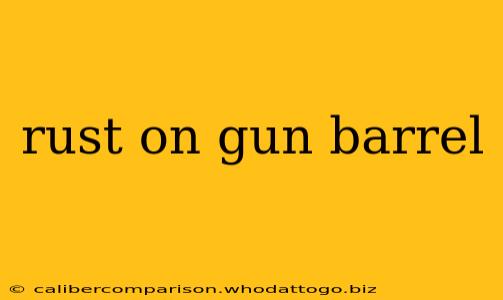Rust. The bane of any firearm owner's existence. Seeing that tell-tale orange discoloration creeping onto your prized gun barrel is disheartening, and rightly so. Rust isn't just an aesthetic problem; it compromises the structural integrity of your firearm, impacting accuracy and potentially leading to malfunctions – or worse. This comprehensive guide will cover everything you need to know about rust on gun barrels, from prevention to effective removal, ensuring your firearm remains in peak condition.
Understanding Gun Barrel Rust: The Enemy Within
Rust, or iron oxide, forms when iron (the primary component of steel gun barrels) reacts with oxygen and water. This seemingly simple chemical reaction has devastating consequences for your firearm. Even a small amount of rust can significantly weaken the barrel's metal, leading to:
- Reduced Accuracy: A roughened barrel surface caused by rust disrupts the smooth passage of the projectile, affecting its trajectory and impacting accuracy.
- Increased Friction: Rust increases friction between the bullet and the barrel, potentially leading to increased wear and tear on both.
- Malfunctions: Severe rust can cause the bullet to become stuck in the barrel, leading to dangerous malfunctions.
- Permanent Damage: In advanced cases, rust can cause irreparable damage to the barrel, requiring costly repairs or even rendering the firearm unusable.
Preventing Rust: Proactive Measures for Long-Term Protection
Preventing rust is far easier than removing it. Here are some key preventative measures:
1. Proper Cleaning and Lubrication: The Foundation of Rust Prevention
Regular cleaning is paramount. After each use, thoroughly clean your firearm, removing all traces of gunpowder residue, oil, and debris. Use a suitable cleaning solvent and gun oil specifically designed for firearms. Pay particular attention to the barrel, ensuring all areas are clean and lubricated.
2. Storage is Key: Environmental Control and Protective Measures
How you store your firearm significantly impacts its susceptibility to rust.
- Dry Environment: Store your firearm in a cool, dry place with low humidity. A gun safe with a desiccant is highly recommended.
- Protective Cases: Use a gun case or sock to protect your firearm from dust and moisture. Silicone gun cloths can further aid in moisture absorption.
- Avoid Direct Contact with Other Metals: Storing your firearm in direct contact with other metals can accelerate rust formation due to galvanic corrosion.
3. Choosing the Right Lubricant: The Shield Against Corrosion
Select a high-quality gun oil formulated to protect against rust and corrosion. Apply a thin, even coat to all metal surfaces, including the barrel, after cleaning. Reapply periodically, especially in humid environments.
Removing Rust: Techniques and Considerations
If rust has already taken hold, prompt action is crucial. Here are some methods for rust removal, ranging from simple to more advanced techniques:
1. Gentle Removal with Bronze Wool or a Bore Brush: For Surface Rust
For light surface rust, carefully use a bronze wool pad or a bore brush designed for cleaning gun barrels. Apply gentle pressure to avoid damaging the barrel's rifling. Follow with thorough cleaning and lubrication.
2. Chemical Rust Removal: For Moderate to Severe Rust
For more stubborn rust, specialized chemical rust removers designed for firearms can be effective. Always follow the manufacturer's instructions carefully, as these chemicals can be corrosive. After using a chemical remover, thoroughly clean and lubricate the barrel.
3. Professional Intervention: When Rust Becomes Unmanageable
For severe rust damage, it's best to seek professional help from a qualified gunsmith. They possess the expertise and specialized tools to address significant rust damage without further harming the firearm.
Maintaining Your Firearm: Long-Term Care and Prevention
Regular maintenance is the key to preventing rust and ensuring the longevity of your firearm. This includes:
- Regular cleaning and lubrication: A consistent cleaning routine is the cornerstone of rust prevention.
- Proper storage: Maintain a controlled storage environment to minimize exposure to moisture and humidity.
- Inspect regularly: Periodically inspect your firearm for any signs of rust, addressing any issues promptly.
Rust on a gun barrel is a serious issue, but with proper preventative measures and timely action, you can protect your investment and maintain the integrity of your firearm. Remember, prevention is always better than cure. By following the guidance above, you can keep your firearm in top condition for years to come.

